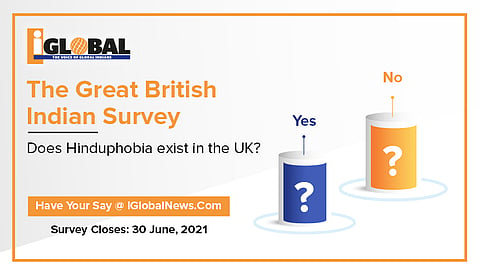

As part of the regular Great British Indian Survey series, iGlobal believes it is time to get the pulse of the diaspora on Hinduphobia – the term itself and the act of anti-Hindu hatred.
The issue was thrown into the spotlight recently with the case of Rashmi Samant, an Indian student studying at Oxford University who has since lodged a formal complaint over what many felt was a case of anti-Hindu hate by a staff member.
“For as long as it takes, anti-Hindu bigotry will be opposed and countered with grace and dignity. Students should not have to face targeted bullying and harassment on campus or online, purely because they are Hindus,” says Samant, as she found overwhelming support on campus as well as from members of the Indian diaspora.
In fact, as many 119 British Hindu organisations issued a joint letter to 10 Downing Street in London to urge action against an Oxford University faculty member for his alleged “Hindu hatred and bigoted views”.
“HFB strongly ask the University of Oxford to deal with Dr A Sarkar in the strictest possible way so that in future no one has to go through bullying and hatred as Ms Samant has gone through at Oxford,” notes the Hindu Forum of Britain (HFB).
MORE LIKE THIS…
Hinduphobia is a set of antagonistic, destructive, and derogatory attitudes and behaviours towards Sanatana Dharma (Hinduism) and Hindus that may manifest as prejudice, fear, or hatred – this is the working definition referenced recently at the Understanding Hinduphobia Conference hosted by Rutgers University Natya and Hindu Students Council in the US.
Ever since, there have been calls for the definition to be considered in the UK and more universally, just as Islamophobia is recognised as anti-Muslim hate and Antisemitism as an attack on the Jewish community.
“Eighty per cent of respondents experienced prejudice as a result of their Indian identity within the past 24 months. Of which, the largest type of prejudice reported is Hinduphobia,” concluded a recent study by the 1928 Institute, supported by Linacre College, University of Oxford.
“It is critical that anti-Indian racism, in particular Hinduphobia, is acknowledged and addressed by institutions such as media houses and universities. We recommend that this type of discrimination should be framed in a similar, zero-tolerance manner to that of Islamophobia and Antisemitism,” the ‘Identity, Political Representation & Policy Priorities: The British Indian Experience’ report released last month declared.
MORE LIKE THIS…
As the debate around this topic continues to gather momentum, it is about time we arrived at some level of consensus to be able to take the collective views of the British Indian community over this issue to the relevant authorities. And, that is where iGlobal’s Great British Indian Survey comes in.
“Whilst people may discount any word with 'phobia' attached as a 'me too' bandwagon, it is worrying for us who are Hindu. The rabid hatred against those of our faith by those who are ignorant, racist, misguided, or just full of hate and pick any characteristic of differentiation to express themselves,” notes Alpesh Patel OBE, an investment expert and Chair of the City Hindus Network in London.
Hindu Council UK prefers to focus on the term “anti-Hindu” but agrees there is a need to acknowledge the issue as one of serious concern.
“We take responsibility for our Karma and where we need to change we try to do so; but where people attack us, then we will have to challenge them on their anti-Hindu agenda or propaganda,” says Anil Bhanot, founding-member of Hindu Council UK.